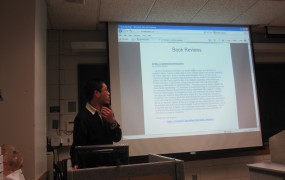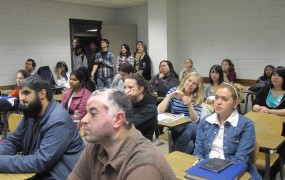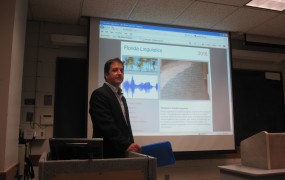The peculiarities of prescriptive versus descriptive grammar
Wednesday, September 28th, 2011 @ 2:56AM
–Article by Joel Deacon
To get the basics of what grammar is and the distinction between prescriptive and descriptive grammar, please read Lee Ballard’s blog post “What is Grammar?”
Prescriptive and Descriptive Grammar in the Classroom:
Perhaps the term prescriptive grammar is more relevant when one is teaching a language to people who already speak it, teaching language A to so called native speakers of language A. In this way prescriptivism is trying to change someone’s language because he or she speaks (writes) in an “incorrect” manner. I placed write in parenthesis because writing does not hold to the same degree of naturalness as does speaking.
The absurdity of prescriptivism in this setting can be witnessed when normal school children who live in an English speaking community and have English speaking parents have to lament that they are failing English. However, their lamentations are perfectly natural to all the English ears around them. Naturalness and descriptivism go hand in hand, as to be discussed later. Furthermore, the prescriptive situation described above also involves a lack of understanding or explanation from both parties involved. In the case of the student, he or she sees no need to change or modify his or her speech. In the case of the teacher, he or she often feels that no explanation for advocating Form A over B is really needed because what is being taught is “correct”. (Look I found a book that claims to be a grammar book that says what I am saying, and no one ever lies in a book.) This situation is important to recognize because it further distinguishes the type of prescriptive grammar given here, the more textbook definition, from prescriptive grammar as is taught to non-native speakers. I will call the type of prescriptivism above “formal prescriptivism”.
On the other hand descriptive grammar attempts to capture the patterns that native speakers produce competently. In other words, it is the patterns native speakers use naturally without self or peer correction. It is theoretically impossible to ever say you have the absolute correct descriptive grammar because no one has ever accounted for all the data because the data is theoretically infinite in size. Moreover, languages change in perpetuity and thus what was once an accurate description is no longer true. Linguistics feels that when we arbitrarily decide that a past form should be imposed upon present language use, we are committing one of the prescriptive sins. The other prescriptive sin is deliberately trying to add grammatical features from one language to another because there is a belief that the latter is superior. (We all should know that languages borrow from each other naturally though, however, argument could be made on this point.) Thus while seemingly all prescriptive grammar comes from descriptive grammar, at times grammarians prescribe descriptions from other languages or mathematical logic, the story of Robert Lowth and double negatives. This often amounts to giving Type A blood to a Type B person. Nonetheless, rules from natural language can be successfully learned and incorporated just as one learns a foreign language. It is unclear how much foreign grammar interacts with native grammar, how much remains on the periphery versus how much percolates to the core. However, it most certainly interacts. Thus teaching grammar prescriptively can have effects even if it is far removed from actual description.
To recapitulate and clarify, descriptive grammar is recording language patterns in natural settings from a roughly homogenous group. Prescriptive grammar is elevating Form A over Form B because Form A is believed to better. Again, a reason for such belief is not necessary. Also teaching pronunciation is teaching a type of grammar (i.e patterns of speech).
When teaching a second, third etc… language you have to be prescriptive. In the field of SLA the idea of inter-languages is well established. This is the idea that language learners create/innovate grammars as they travel from their native language to their target language. This is why many, perhaps all, errors are systematic. Mistakes on the other hand are more like slips of the tongue. Now if students were happy or content with the inter-language they have developed, then they would not be enrolled at a language learning institute. Forgive my idealization for a moment. Thus they believe they are incorrect, most of the time, and so do the teachers. This is a big difference from the setting that creates formal prescriptivism as described above. Foreign Language learners want to change the way they speak to get closer to the target language. In this way teachers must prescribe to them patterns that are unnatural for them. We certainly are not going to just describe what they are already doing and say that it is interesting because such action is not what we are hired to do. There should be no issue here. However, there is a choice as to deciding what the target really is.
Let’s consider English. Is the target GMAT or IELTS English or is it Engineering or Literary English? Beyond that, is it news anchor English, Ebonics, Appalachian English, some other noticeably accented form of English, or just the dialect of the teacher mixed with some notions of “Standard English”? Students are never given and rarely inquire about so much specificity regarding their target because they too believe that they are just learning English, as if such a thing neatly existed.
The reason the choice of the target is important is that just like with formal prescriptivism this prescriptivism, while unavoidable, lends itself to the same biases. Gender and culture can be marginalized. It may be important for student A to be able to speak in a quote on quote masculine or feminine manner. As an aside, most western men who go to Japan speak in a feminine manner because they were taught by women. This does not ostensibly aid them in the business world.
To move along, Black and Appalachian Englishes are looked down upon, so those forms will not pragmatically be the target. No English language learning program uses them as the target to my knowledge. Thus the target would appear to be the most prestigious or advantageous form of English. Can anyone tell me what this is?
If ethics are now formally injected, they must compete with such pragmatic sensibility. If I am in the business world of America, I don’t want to speak or write one of the varieties of Appalachian or Black English because we believe they are not perceived as being educated forms of speech. One’s perception will undoubtedly carry them a long way with regards to raises and promotions. Are we not ethically responsible for enabling our students with the best chance possible? I will temporally rest with this.
Posted by floridalinguistics
Categories: Featured, Joel Deacon









